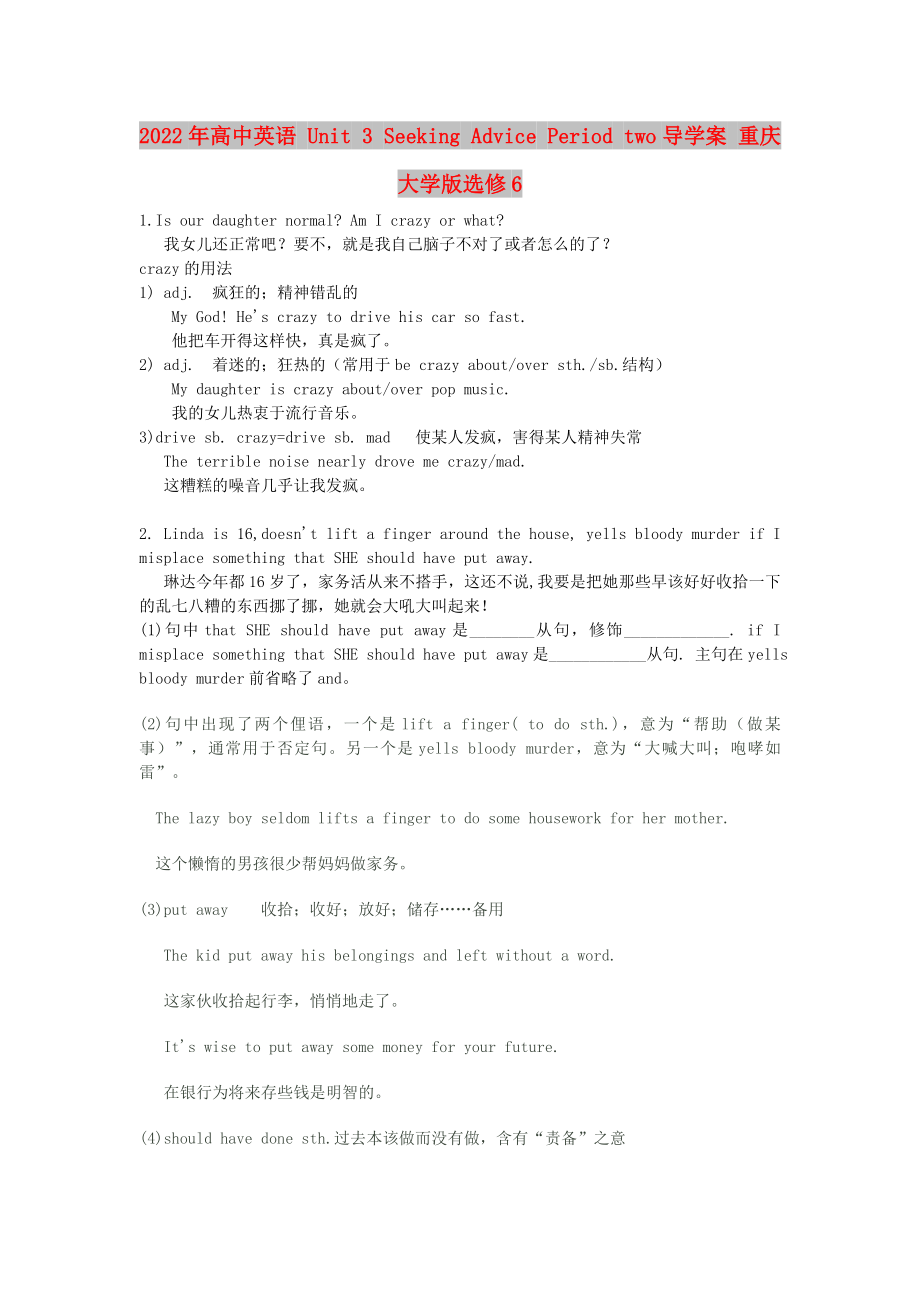《2022年高中英語(yǔ) Unit 3 Seeking Advice Period two導(dǎo)學(xué)案 重慶大學(xué)版選修6》由會(huì)員分享��,可在線閱讀�,更多相關(guān)《2022年高中英語(yǔ) Unit 3 Seeking Advice Period two導(dǎo)學(xué)案 重慶大學(xué)版選修6(3頁(yè)珍藏版)》請(qǐng)?jiān)谘b配圖網(wǎng)上搜索。
1�����、2022年高中英語(yǔ) Unit 3 Seeking Advice Period two導(dǎo)學(xué)案 重慶大學(xué)版選修6
1.Is our daughter normal? Am I crazy or what?
我女兒還正常吧?要不�,就是我自己腦子不對(duì)了或者怎么的了?
crazy的用法
1) adj. 瘋狂的���;精神錯(cuò)亂的
My God! He's crazy to drive his car so fast.
他把車開得這樣快�����,真是瘋了��。
2) adj. 著迷的��;狂熱的(常用于be crazy about/over sth./sb.結(jié)構(gòu))
My da
2�����、ughter is crazy about/over pop music.
我的女兒熱衷于流行音樂����。
3)drive sb. crazy=drive sb. mad 使某人發(fā)瘋�����,害得某人精神失常
The terrible noise nearly drove me crazy/mad.
這糟糕的噪音幾乎讓我發(fā)瘋。
2. Linda is 16,doesn't lift a finger around the house, yells bloody murder if I misplace something that SHE should have
3���、 put away.
琳達(dá)今年都16歲了����,家務(wù)活從來(lái)不搭手�,這還不說,我要是把她那些早該好好收拾一下的亂七八糟的東西挪了挪,她就會(huì)大吼大叫起來(lái)�����!
(1)句中that SHE should have put away是________從句���,修飾_____________. if I misplace something that SHE should have put away是____________從句. 主句在yells bloody murder前省略了and�����。
(2)句中出現(xiàn)了兩個(gè)俚語(yǔ)��,一個(gè)是lift a finger( to do sth.)���,意為“幫助(做某事)”��,
4、通常用于否定句���。另一個(gè)是yells bloody murder�,意為“大喊大叫�;咆哮如雷”。
The lazy boy seldom lifts a finger to do some housework for her mother.
這個(gè)懶惰的男孩很少幫媽媽做家務(wù)��。
(3)put away 收拾��;收好��;放好�;儲(chǔ)存……備用
The kid put away his belongings and left without a word.
這家伙收拾起行李,悄悄地走了���。
It's wise to put away some money for your fu
5�����、ture.
在銀行為將來(lái)存些錢是明智的����。
(4)should have done sth.過去本該做而沒有做,含有“責(zé)備”之意
You are late again. Tom, you should have e here earlier.
湯姆��,你又遲到了�,你本該早點(diǎn)來(lái)這兒的。
3.She has a burst of temper if I don't have her blouses pressed in time. 我要是沒來(lái)得及幫她把短衫熨好�,她就像吃了火藥一樣沖我發(fā)脾氣!
(1)句中a burst of temper表示“大發(fā)脾氣”
It's
6����、 not good to our health, if we often have a burst of temper.
如果我們常常發(fā)脾氣,這對(duì)我們身體有害��。
【聯(lián)想】1) temper的常見搭配
control/keep one's temper 捺住性子���,忍著氣
lose one’s temper 動(dòng)怒����,發(fā)脾氣
out of temper 生氣���,發(fā)脾氣
in a good/bad temper 心情好/壞
2) burst的常用短語(yǔ)
a burst of laughter突發(fā)的笑聲 a burst of anger
7�、發(fā)怒
burst into tears放聲大哭 burst into the room 闖入房間
burst out laughing 突然大笑起來(lái)
(2)have sth. /sb. done表示“讓某事由別人做”或“遇到某種情況”
Last week she had her watch stolen. 她的手表上周被盜了��。
The young mother has her baby looked after, for she is too busy.
那位年輕的媽媽請(qǐng)人照顧小孩����,因?yàn)樗α恕?
8�、
【聯(lián)想】
1) have sb. do=make sb. do=let sb. do = get sb. to do讓某人做某事
This pany often has their staff have a holiday once a year.
這家公司常常讓員工們一年休假一次���。
It's illegal to have children under 16 years old work in any factory.
任何工廠雇傭十六歲以下的童工都是非法的。
2) have sb./sth. doing讓某人一直做某事�����;維持某種狀態(tài)
I
9�、 have the car waiting outside. 我讓車在門外等著。
Don’t have the puter working all day. 不要讓電腦整天開著�����。
3) have sth. to do 有某事要做
I have an announcement to make, please be quiet.
請(qǐng)安靜下來(lái)����,我要宣布一個(gè)通知。
4. If you don’t cut that out, I’m going to move to another row and act like I don’t know you. 再不打住���,我就
10�����、當(dāng)不認(rèn)識(shí)你��,去另外一排了�����!
cut out意為“停止做���;戒掉”
I finally persuaded my Dad to cut out smoking. 我終于說服父親戒煙了���。
另外cut out還有“剪除;切掉�����;割掉”之意�����。
The tailor is cutting out a dress for a young lady.
裁縫正在為一位年輕的女士裁剪裙子�����。
【聯(lián)想】cut的常見短語(yǔ)
1) cut up切碎,剁碎���;使難過
She is cutting up the meat for supper. 她正在切晚飯用
11�����、的肉�。
Jean was really cut up when her husband left her.
當(dāng)她丈夫離開她時(shí),吉恩的心都碎了�����。
2) cut down砍倒��;削減�;壓縮
We'll have to cut down the cost of the business to keep it going.
為了使交易能夠進(jìn)行��,我們必須降低成本�����。
The doctor told him to cut down on his drinking. 醫(yī)生勸他少喝酒����。
3) cut in插進(jìn)來(lái)說,插嘴
He is always c
12��、utting in when I speak. 我說話時(shí)他常插嘴。
4) cut off切斷�,中斷供應(yīng),使……與外界隔絕
e on! Cut off the power! The machine is on fire!
快���!切斷電源��!這機(jī)器著火了!
The village was cut off by the snow for more than a month.
由于大雪���,這村子和外界隔絕一個(gè)多月了。
5) cut … into pieces 切成碎片
I used to cut meat into pieces for my c
13�、hicken in my childhood.
我小時(shí)候常常把肉切碎喂我的小雞。
【練習(xí)】
It is a pity that so many trees ______________ for fire wood.
She kept ____________ on our conversation.
The workman had a finger _________ by the machine he was operating.
I have been advised to _________ sugar of my diet.
He _________ the
14�����、 meat on his plate.
5. You said���,‘‘Never go to bed mad.’’ How I wish I had taken that advice.
你告訴我們說����,“夫妻沒有隔夜仇”�。我要是聽從了你的建議該多好。
(1)mad在此為形容詞���,用作狀語(yǔ)�,表示伴隨。
Our boss went out of the office��,angry and disappointed.
老板走出了辦公室�����,既生氣又失望�����。
The old man passed away���,satisfied, and silent.
老人帶
15、著滿意和安詳離開了�。
(2)How I wish I had taken that advice.為虛擬語(yǔ)氣,表示一種沒有實(shí)現(xiàn)或者不可能實(shí)現(xiàn)的愿望, 有三種情況表達(dá):
1) 現(xiàn)在:用過去式(be動(dòng)詞用were)
2) 過去:用過去完成式 (had done)
3) 將來(lái):用情態(tài)動(dòng)詞(would / could) + do
How I wish I could help you, but I have to leave at once.
我多么愿意幫你啊����,但是我不得不馬上離開。
How I wish I had listened to what my parents told me.
 2022年高中英語(yǔ) Unit 3 Seeking Advice Period two導(dǎo)學(xué)案 重慶大學(xué)版選修6
2022年高中英語(yǔ) Unit 3 Seeking Advice Period two導(dǎo)學(xué)案 重慶大學(xué)版選修6

